*/
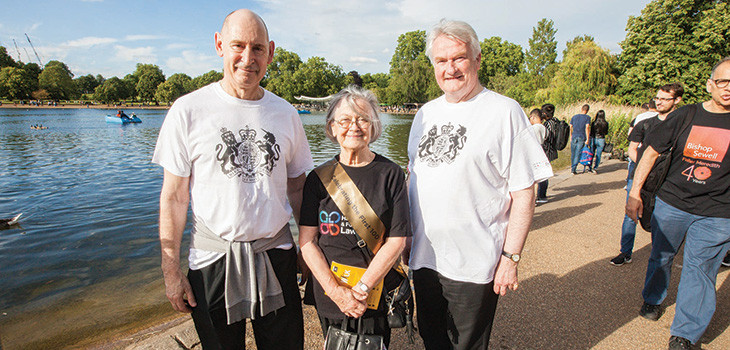
For over 20 years, the London Legal Walk has been raising vital funds for advice agencies. LLST founder Bob Nightingale maps the walk’s history and asks for your help in breaking the £1 million barrier this year
Even back in 2003, when London Legal Support Trust (LLST, the ‘Trust’) was formed, there was insufficient funding to cope with the need for free legal advice for those trying to access justice. Working as the CEO of South West London Law Centres and chairing Law Centres Network, I established LLST to fundraise in order to address the gap in funding for advice agencies that provided free specialist legal advice, and it was registered as a charity in 2004.
In its first few years, LLST enjoyed generous donations from law firms such as Simmons & Simmons and Hogan Lovells but realised it needed to do more to make the difference needed. Thus, the London Legal Walk was born, with help from Rebecca Wilkie of LawWorks (then SPBG), Professor Chandler from the University of Law, and staff from South West London Law Centres and Allen & Overy, who formed a committee and devised the route and publicity for the first walk.
The then Master of the Rolls, Lord Phillips and Kevin Martin, Vice President of the Law Society, agreed to lead the walk, which started the tradition of lead walkers. Another great moment was when Lord Woolf, the then Lord Chief Justice, also joined the walk. The status of the walk grew substantially with the support of the senior Judiciary, also helping to attract firms and chambers to offer their support.
The support from Allen & Overy in producing the maps and posters was invaluable. Since 2016, the LLST has received promotional support from Freshfields, which also makes a huge contribution.
At the first walk in 2005, 330 walkers in 47 teams raised £37,000. This enabled LLST to start providing significant grants to some of London’s advice agencies providing life-changing free legal advice to vulnerable people. Seeing the potential fundraising opportunities and support the walk attracted from the legal sector, Lord Phillips called for the walk to become an annual event.
The walk has grown in size, fundraising and stature since then. Each year, it is fronted by lead walkers, including the Lord Chief Justice, Master of the Rolls, President of the Law Society, Chair of the Bar and, in later years, the Attorney and Solicitor Generals (starting with Baroness Scotland) and the Director of Public Prosecutions (starting with Keir Starmer KC).
Developments in technology and social media have enabled walk publicity to reach wider sections of London’s legal community.
By 2010, the walk had grown to 4,500 walkers, raising £400,000. In 2012, Natalia Rymaszewska, Deputy CEO of LLST, introduced a street party to the walk, enhancing its attraction for participants. The walk went from strength to strength and by 2015, there were 9,000 walkers, who raised £700,000. The walk also enjoyed additional staff capacity, with more team members coming on board, in particular Philippa Hicks, Head of Events & Fundraising, who has organised the walk with me since 2016 and led technical and organisational improvements that have played a big role in increasing fundraising. In 2019, the year before the lockdowns, 15,000 walkers raised £890,000. Early indications of the 2020 walk were heading towards £1 million, but COVID-19 meant that the walk could not take place in person. Thanks to the imaginative events team, the walk was held virtually and raised almost £600,000, despite the lockdown’s huge impact on mass events. Moreover, LLST managed to keep up its usual level of grants to free legal advice agencies that desperately needed the funding under COVID-19. When restrictions were lifted, a mixture of an in-person and online 2021 walk raised £655,000.
Thankfully, in 2023, the walk recovered fully, with a record 16,000 walkers taking to the streets from 1,000 organisations, raising a massive £965,000 and taking overall fundraising for the walk to over £10 million in its 19 years.
Each year, over 100 agencies benefit from the funds. Many enter teams to raise funds for their own services, while others receive grants from the pool of funds. This includes 43 agencies approved as Centres of Excellence (COEx) by LLST, receiving annual unrestricted grants from the walk fundraising. 38 of these agencies helped over 187,000 people in 2021/2.
The vital unrestricted funds raised through the walk have made a huge difference to the ability of advice agencies to continue delivering help to people in need as they have struggled against a backdrop of increasing need and reducing funding.
Cuts in legal aid and local authority grants have had a severe impact on people needing to access support with everyday issues. The introduction of payment per case that replaced payment per hour had huge financial implications on the ability of legal aid providers, including advice agencies, to help the most vulnerable, whose cases often take the longest to complete. Then, in 2013, LASPO (The Legal Aid, Sentencing and Punishment of Offenders Act 2012) removed several areas of social welfare law from the scope of legal aid and payment for legal aid cases has not kept up with inflation. All of this had huge financial implications on legal aid contract holders.
When austerity deepened, this put further pressure on funding to local authorities, and they, in turn, reduced grants to advice agencies.Meanwhile, the need for legal advice has grown considerably. Research shows that one-third of people in England and Wales have an unmet legal need. Trust for London’s Poverty Profile indicates that 25% of Londoners live in poverty after housing costs. Of those, 39% of Londoners living in non-white households and 53% of single parents in London are living in poverty after housing costs.
LLST’s recent Cost-of-Living Advice Project, funded by the Greater London Authority and run in partnership with London Citizens Advice, shows that every £1 invested in advice services gained £4.13 of income for Londoners.
Yet, we know that fundraising from events alone can’t offset such large funding cuts. So, the Trust has used its reputation to encourage other charities to increase their funding to the legal advice sector. This has increased the funds that LLST distributes to almost £2 million in 2022 to a projected £3 million in 2023.
The Trust has also widened its remit to provide more than simple grant funding to agencies. It operates a buying consortium to enable agencies to get the best value on everything from stationery to photocopiers; places billing consultants with agencies to maximise their income from legal aid; runs a London-wide specialist advice forum to bring legal advice agencies together to share good practice and resources and recently started to coordinate partnership work with trusts and foundations, including The City Bridge Foundation, Trust for London, The National Lottery Community Foundation, Paul Hamlyn Foundation, The Legal Education Foundation and Greater London Authority, under London Funder’s Propel initiative to start responding to advice workforce crisis issues in the sector.
The cost-of-living crisis, coming straight after the lockdowns, has continued to increase the need for free legal advice services. This means that fundraising needs to continue to rise. Consequently, the Trust is already working hard to make the 2024 London Legal Walk the first to raise over £1 million. That is entirely dependent on the goodwill of the legal profession, which, thankfully, has been stalwart and increasing for 20 years.
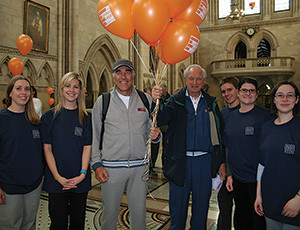
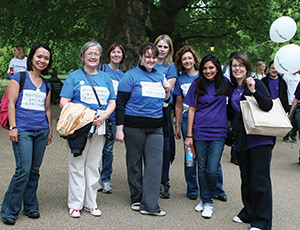
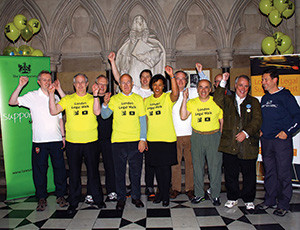
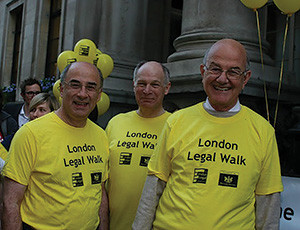
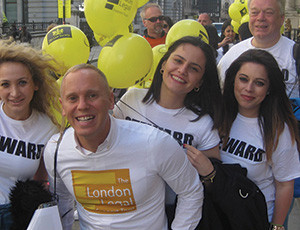
Marshals with Rob Rinder.

Even back in 2003, when London Legal Support Trust (LLST, the ‘Trust’) was formed, there was insufficient funding to cope with the need for free legal advice for those trying to access justice. Working as the CEO of South West London Law Centres and chairing Law Centres Network, I established LLST to fundraise in order to address the gap in funding for advice agencies that provided free specialist legal advice, and it was registered as a charity in 2004.
In its first few years, LLST enjoyed generous donations from law firms such as Simmons & Simmons and Hogan Lovells but realised it needed to do more to make the difference needed. Thus, the London Legal Walk was born, with help from Rebecca Wilkie of LawWorks (then SPBG), Professor Chandler from the University of Law, and staff from South West London Law Centres and Allen & Overy, who formed a committee and devised the route and publicity for the first walk.
The then Master of the Rolls, Lord Phillips and Kevin Martin, Vice President of the Law Society, agreed to lead the walk, which started the tradition of lead walkers. Another great moment was when Lord Woolf, the then Lord Chief Justice, also joined the walk. The status of the walk grew substantially with the support of the senior Judiciary, also helping to attract firms and chambers to offer their support.
The support from Allen & Overy in producing the maps and posters was invaluable. Since 2016, the LLST has received promotional support from Freshfields, which also makes a huge contribution.
At the first walk in 2005, 330 walkers in 47 teams raised £37,000. This enabled LLST to start providing significant grants to some of London’s advice agencies providing life-changing free legal advice to vulnerable people. Seeing the potential fundraising opportunities and support the walk attracted from the legal sector, Lord Phillips called for the walk to become an annual event.
The walk has grown in size, fundraising and stature since then. Each year, it is fronted by lead walkers, including the Lord Chief Justice, Master of the Rolls, President of the Law Society, Chair of the Bar and, in later years, the Attorney and Solicitor Generals (starting with Baroness Scotland) and the Director of Public Prosecutions (starting with Keir Starmer KC).
Developments in technology and social media have enabled walk publicity to reach wider sections of London’s legal community.
By 2010, the walk had grown to 4,500 walkers, raising £400,000. In 2012, Natalia Rymaszewska, Deputy CEO of LLST, introduced a street party to the walk, enhancing its attraction for participants. The walk went from strength to strength and by 2015, there were 9,000 walkers, who raised £700,000. The walk also enjoyed additional staff capacity, with more team members coming on board, in particular Philippa Hicks, Head of Events & Fundraising, who has organised the walk with me since 2016 and led technical and organisational improvements that have played a big role in increasing fundraising. In 2019, the year before the lockdowns, 15,000 walkers raised £890,000. Early indications of the 2020 walk were heading towards £1 million, but COVID-19 meant that the walk could not take place in person. Thanks to the imaginative events team, the walk was held virtually and raised almost £600,000, despite the lockdown’s huge impact on mass events. Moreover, LLST managed to keep up its usual level of grants to free legal advice agencies that desperately needed the funding under COVID-19. When restrictions were lifted, a mixture of an in-person and online 2021 walk raised £655,000.
Thankfully, in 2023, the walk recovered fully, with a record 16,000 walkers taking to the streets from 1,000 organisations, raising a massive £965,000 and taking overall fundraising for the walk to over £10 million in its 19 years.
Each year, over 100 agencies benefit from the funds. Many enter teams to raise funds for their own services, while others receive grants from the pool of funds. This includes 43 agencies approved as Centres of Excellence (COEx) by LLST, receiving annual unrestricted grants from the walk fundraising. 38 of these agencies helped over 187,000 people in 2021/2.
The vital unrestricted funds raised through the walk have made a huge difference to the ability of advice agencies to continue delivering help to people in need as they have struggled against a backdrop of increasing need and reducing funding.
Cuts in legal aid and local authority grants have had a severe impact on people needing to access support with everyday issues. The introduction of payment per case that replaced payment per hour had huge financial implications on the ability of legal aid providers, including advice agencies, to help the most vulnerable, whose cases often take the longest to complete. Then, in 2013, LASPO (The Legal Aid, Sentencing and Punishment of Offenders Act 2012) removed several areas of social welfare law from the scope of legal aid and payment for legal aid cases has not kept up with inflation. All of this had huge financial implications on legal aid contract holders.
When austerity deepened, this put further pressure on funding to local authorities, and they, in turn, reduced grants to advice agencies.Meanwhile, the need for legal advice has grown considerably. Research shows that one-third of people in England and Wales have an unmet legal need. Trust for London’s Poverty Profile indicates that 25% of Londoners live in poverty after housing costs. Of those, 39% of Londoners living in non-white households and 53% of single parents in London are living in poverty after housing costs.
LLST’s recent Cost-of-Living Advice Project, funded by the Greater London Authority and run in partnership with London Citizens Advice, shows that every £1 invested in advice services gained £4.13 of income for Londoners.
Yet, we know that fundraising from events alone can’t offset such large funding cuts. So, the Trust has used its reputation to encourage other charities to increase their funding to the legal advice sector. This has increased the funds that LLST distributes to almost £2 million in 2022 to a projected £3 million in 2023.
The Trust has also widened its remit to provide more than simple grant funding to agencies. It operates a buying consortium to enable agencies to get the best value on everything from stationery to photocopiers; places billing consultants with agencies to maximise their income from legal aid; runs a London-wide specialist advice forum to bring legal advice agencies together to share good practice and resources and recently started to coordinate partnership work with trusts and foundations, including The City Bridge Foundation, Trust for London, The National Lottery Community Foundation, Paul Hamlyn Foundation, The Legal Education Foundation and Greater London Authority, under London Funder’s Propel initiative to start responding to advice workforce crisis issues in the sector.
The cost-of-living crisis, coming straight after the lockdowns, has continued to increase the need for free legal advice services. This means that fundraising needs to continue to rise. Consequently, the Trust is already working hard to make the 2024 London Legal Walk the first to raise over £1 million. That is entirely dependent on the goodwill of the legal profession, which, thankfully, has been stalwart and increasing for 20 years.





Marshals with Rob Rinder.
For over 20 years, the London Legal Walk has been raising vital funds for advice agencies. LLST founder Bob Nightingale maps the walk’s history and asks for your help in breaking the £1 million barrier this year


The Chair of the Bar sets out how the new government can restore the justice system
In the first of a new series, Louise Crush of Westgate Wealth considers the fundamental need for financial protection
Unlocking your aged debt to fund your tax in one easy step. By Philip N Bristow
Possibly, but many barristers are glad he did…
Mental health charity Mind BWW has received a £500 donation from drug, alcohol and DNA testing laboratory, AlphaBiolabs as part of its Giving Back campaign
The Institute of Neurotechnology & Law is thrilled to announce its inaugural essay competition
How to navigate open source evidence in an era of deepfakes. By Professor Yvonne McDermott Rees and Professor Alexa Koenig
Brie Stevens-Hoare KC and Lyndsey de Mestre KC take a look at the difficulties women encounter during the menopause, and offer some practical tips for individuals and chambers to make things easier
Sir Geoffrey Vos, Master of the Rolls and Head of Civil Justice since January 2021, is well known for his passion for access to justice and all things digital. Perhaps less widely known is the driven personality and wanderlust that lies behind this, as Anthony Inglese CB discovers
The Chair of the Bar sets out how the new government can restore the justice system
No-one should have to live in sub-standard accommodation, says Antony Hodari Solicitors. We are tackling the problem of bad housing with a two-pronged approach and act on behalf of tenants in both the civil and criminal courts